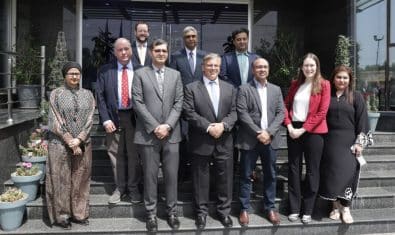The International Monetary Fund (IMF) successfully prevented Pakistan from defaulting on its debt, providing the nation with much-needed relief. Functioning as the lender of last resort, the IMF displayed commendable transparency in acknowledging the unsustainability of Pakistan’s indebtedness, employing diplomatic strategies to address the issue.
The risks associated with this situation are extremely high, with limited avenues for achieving long-term financial stability. Meeting the various challenging requirements will entail implementing austerity measures that Pakistan has yet to accomplish successfully.
This year, Pakistan is compelled to generate a surplus in its primary fiscal budget, a feat last achieved two decades ago during the war on terrorism when external grants were abundant. Sustaining this achievement for at least the next four years is imperative. However, given global standards, the probability of accomplishing this goal is a mere 0.15.
“The impact on investor confidence varies by country,” said Maheen Rahman, CEO of InfraZamin Pakistan, which offers credit guarantees that de-risk projects and transactions to enable access to finance to underserved sectors and companies. “In Pakistan, we are witnessing a return to normalcy in the dollar market, including easing import restrictions and lifting currency restrictions. However, we have about a year to manage significant changes and navigate the upcoming political process, scheduled for mid-FY 2024.”
Several significant changes must be made to achieve a sustainable level of debt. Stricter budgets, stable currency values, and increased growth rates are essential, despite the challenges posed by fiscal and monetary policies.
Sadly, the International Monetary Fund (IMF) has a history of providing overly optimistic projections regarding Pakistan’s public debt and key factors such as the primary deficit, interest rates, and growth.
Failure to address the situation honestly, as seen in many global cases, will result in severe austerity measures that provide little protection for vulnerable groups and may lead to more severe consequences in the future.
It is disheartening that the IMF seemed to ignore its recent research, highlighting that debt consolidations alone do not make debt more sustainable. In times of distress, additional measures like debt restructuring should be considered.
Over the next three years, Pakistan needs around $88 billion to repay upcoming external debts and cover minimal current account deficits. This leaves hardly any room for maneuvering. Maintaining a positive relationship with the IMF through an ongoing program is crucial, as this has not been common in Pakistan’s history.
“Considering the existing policies that narrow rather than broaden the tax base, adversely impacting the business environment, it is implausible to anticipate rapid growth in exports or remittances to support a controlled current account balance sufficiently,” said Ali Rehman, a founding team member of Hefazat Technologies, an InsurTech start-up backed by a Sarmayacar LP. “Hence, the probability of meeting Pakistan’s external obligations without restructuring seems increasingly unlikely.”
Pakistan’s growth model, heavily reliant on fiscal stimuli and borrowing from domestic and foreign sources, has resulted in a substantial debt burden for future generations. It is no longer feasible, given the current state of debt. To transition to a more sustainable model, Pakistan must focus on boosting exports, encouraging investments, and improving productivity.
However, there are concerns that international companies such as Bytedance, Google, and Meta, which do not have local offices or make significant reinvestments, are given priority over those creating local jobs and value. This contradicts the IMF’s conditions, which aimed to expand the tax base rather than deepen it and reward companies that extract value from the country.
“If Bytedance, Google, and Meta do not register in Pakistan and pay taxes on their combined earnings of $125 million in this fiscal year, their contribution would be missing,” said Saif Ali, the former executive director at Dastgyr. “Meta currently pays a 2.25% withholding tax instead of the 15% it should. No one has asked the State Bank of Pakistan why that is.”
Pakistan subsidizing Google’s fines to India
In March 2023, the National Company Law Appellate Tribunal (NCLAT), India’s antitrust regulator, imposed a $160 million fine on Google for unfair business practices. For context, last year, Google earned $1.146 billion from the Indian market, where it pays taxes, creates jobs, and reinvests. This is roughly half the money Google makes in Pakistan through YouTube.
The State Bank of Pakistan (SBP) is currently clearing payments from advertisers and agencies to Google, even though it lacks a local presence to pay its due taxes on earnings from YouTube, Play Store, and its advertising network.
Adding insult to Pakistan’s ongoing dollar scarcity injury, Google allows local YouTube content creators to register their channels in other countries and evade funds diverting to Pakistan. In prioritizing clearing dollar payments for Bytedance, Google, and Meta to leave the country, the SBP inadvertently facilitates companies that leech from the country.
In contrast, the SBP could block the release of dollars meant for Bytedance, Google, and Meta by mandating the creation of local financial offices that pay taxes across their P&L, creating jobs, and ushering in local innovation.
Doing so would signal that businesses creating value inside the country will have priority access to the IMF dollars secured rather than those simply extracting value without paying their fair share.
At present, Bytedance, Google, and Meta hold workshops focused on educating advertising executives on its tools while stating that it aims that these programs are part of efforts to participate in the economic development of Pakistan. The reality is that paying due taxes here would go further, which the SBP and policymakers can make happen.
Why should SBP mandate local offices in Pakistan?
At a time when Pakistan’s start-ups are shutting down amid the global funding winter, the establishment of financial offices of Bytedance, Google, and Meta would send the proper signal to the world.
By establishing a financial office in Pakistan, Google would create direct and indirect employment opportunities, stimulating economic growth and reducing unemployment rates. This aligns with Pakistan’s goal to attract foreign investments and promote sustainable development.
A presence in Pakistan can contribute to advancing technological infrastructure as it brings its expertise in digital solutions, high-speed internet accessibility, and innovative services.
Companies that pay corporate taxes have a meaningful say in contributing to the stability and sustainability of Pakistan’s regulatory framework, reinforcing investor confidence. This, in turn, would attract further foreign investments and promote a conducive business environment. The trickle-down benefits would be enhancing the quality of life, promoting economic equality, and improving human capital development.
By evading taxes, Google risks an antitrust case built against it for promoting unfair competition and preventing equitable market conditions.
Historically, tax evasion by multinational corporations creates an uneven playing field and hampers the growth of local enterprises. Paying taxes in Pakistan would align with Google’s corporate responsibility mission and demonstrate its commitment to supporting the communities in which it operates.
What if this doesn’t happen?
To successfully encourage companies such as Bytedance, Google, and Meta to open local financial offices, the SBP must engage in dialogues to clarify any ambiguities that would foster trust and cooperation.
Aside from providing endless entertainment to app users, a higher level of institutional change comes from paying taxes to enhance the reputation of a company known for evasion. This strengthens stakeholder relationships, including governments, customers, and local communities. This positive perception would lead to greater trust, longevity, and potential business opportunities in the country.
Suppose the SBP cannot successfully convince Bytedance, Google, and Meta to open a local office. In that case, it must block local companies from directing doing business with them, even if this means withholding payments from all international companies that are evading taxes.
The alternative for advertisers and agencies will become working directly with local content creators using tools like Walee. Other local alternatives include EzWiFi and TPL Maps for location-based advertising and Alliancez for buying digital advertising inventory.
“We offer seamless local currency payment options, ensuring that working with us is a stress-free experience for businesses and government organizations alike,” said Sarwar Ali Khan, CEO at TPL Maps. “This approach simplifies transactions and contributes to a balanced trade environment, enabling our valued partners to focus on growth and innovation. TPL Maps prides itself on delivering location-based solutions that surpass industry standards.”
Unlike Google Maps, the customer success team of TPL Maps is based in Pakistan. It can address concerns in real-time, as opposed to advertisers and agencies relying on representatives in Singapore and the UAE, who view the Pakistan revenue stream as a rounding error.
“This advantage of being on the ground and in the same time zone allows us to offer prompt and tailored solutions to our client’s unique needs, setting us apart from international competitors,” said Khan. “By offering user-centric solutions, unmatched accuracy in mapping, and empowering our local workforce, we can play a crucial role in transforming the future of location-based services in the region.”
The elixir for growth cannot be reduced to mere appeals for an improved business climate. It is Pakistan’s responsibility to craft this trajectory, and the need for prompt action is paramount.
While the IMF highlights Pakistan’s considerable vulnerability to climate change, it fails to address the pressing question of how a financially strained nation with limited technical capabilities can be expected to finance the necessary substantial investments.
Pakistan serves as an indicator of significant concerns surrounding a global landscape where approximately sixty nations are submerged in debt while simultaneously confronting monumental risks arising from climate change.
In such times, robust global safety nets are of utmost importance. Only time will reveal if Pakistan, and the rest of the world, are adequately prepared for these challenges.























about time